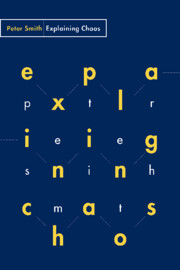5 - Approximate truth
Published online by Cambridge University Press: 22 September 2009
Summary
In Chapter 3, it was argued that worldly phenomena of the kinds typically modelled by chaotic theories cannot exemplify in their time-evolutions the infinitely intricate patterns characteristic of chaos. So even if (as argued in Chapter 4) chaotic theories can be richly predictive, it seems that they cannot be strictly true.
Is this a kind of scepticism about chaos? Not specifically. Dynamical models in classical macrophysics always postulate an infinite precision in the values of the relevant quantities, yet we typically have excellent physical reasons to suppose that these quantities cannot take infinitely precise values. So it is not only chaotic theories that idealize: most of macrophysics is in just the same boat. Does a more global scepticism threaten, then? Surely not. The natural line – implicit, I think, in the comments of working scientists if and when they address the issue – is to allow that such macrophysical theories may idealize, may fail to be true if interpreted by perhaps over-strict standards, but to insist that they can still be more or less approximately true (and can be known to be approximately true).
But what does approximate truth amount to? For reasons that will emerge, it is doubtful that there is any story to be told which is both substantive and general. So let's continue to concentrate on a restricted class of cases – classical dynamical theories that can be regimented by means of a system of linked first-order differential equations of form (D) (§1.1).
- Type
- Chapter
- Information
- Explaining Chaos , pp. 71 - 90Publisher: Cambridge University PressPrint publication year: 1998



